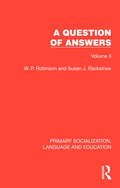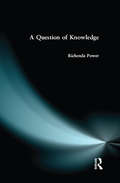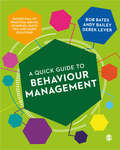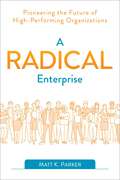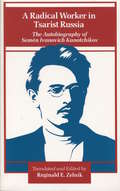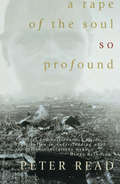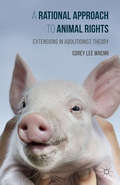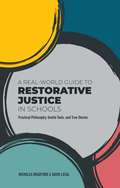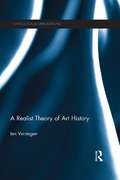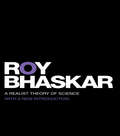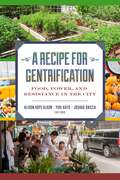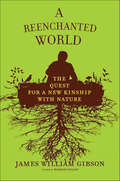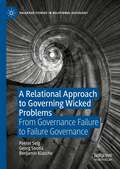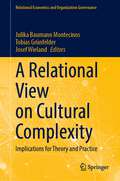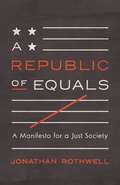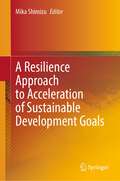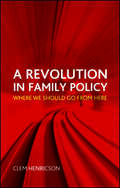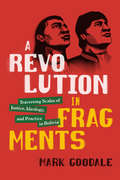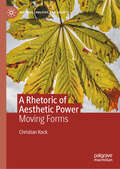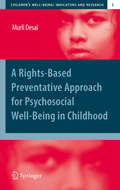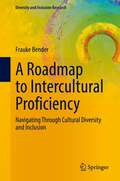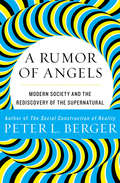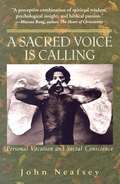- Table View
- List View
A Question of Answers: Volume II (Primary Socialization, Language and Education)
by W. P. Robinson Susan J. RackstrawIn the early 1970s, the problem of arousing and maintaining the curiosity of children had been a recurrent theme in reports concerned with the development of new school curricula. However, before these ideas could be translated into soundly based practical measures, an increased understanding of what is involved in the activities of questioning and answering was needed.Originally published in 1972, the research reported in these two volumes presents a theoretical framework for describing linguistic features of a range of verbally expressed answers and their associated questions. Basil Bernstein’s theory is used to generate a number of predictions about the variety and quality of answers that mothers and children are likely to offer to ‘wh’ questions. The usefulness of the scheme is tested against the answering behaviour of members of different social classes, and, in the main, Bernstein’s predictions are supported. The validity of the categories in the classificatory scheme is explored more fully in later chapters by means of a correlational analysis of the answers of seven-year-old children.Volumes sold separately.
A Question of Knowledge
by Richenda PowerThis book uniquely illustrates the key concepts and issues involved with recent examples drawn from empirical research, highlighting the practical relevance of difficult theoretical and philosophical concepts to the way in which we think and talk about knowledge both in an everyday and in an academic/ sociological context.
A Quick Guide to Behaviour Management
by Andy Bailey Dr Bob Bates Derek LeverEven the best and most experienced teachers can struggle with classroom control and it is likely your experiences will vary day-to-day. Bestselling author of Learning Theories Simplified Bob Bates, together with former head teachers Andy Bailey and Derek Lever, offers one-stop support for all teachers in A Quick Guide to Behaviour Management. Whether you are working with children, young people or adults it will help you: · understand why challenging behaviour occurs · learn how to be a great teacher in the face of challenging behaviour · recognise a range of personalities you may encounter in the classroom and the strategies for dealing with them Blending learning theories with real-life case studies, it fosters a deeper understanding of what causes challenging behaviour and equips you with all you need to know to handle it!
A Quick Guide to Behaviour Management
by Andy Bailey Derek Lever Bob BatesEven the best and most experienced teachers can struggle with classroom control and it is likely your experiences will vary day-to-day. Bestselling author of Learning Theories Simplified Bob Bates, together with former head teachers Andy Bailey and Derek Lever, offers one-stop support for all teachers in A Quick Guide to Behaviour Management. Whether you are working with children, young people or adults it will help you: · understand why challenging behaviour occurs · learn how to be a great teacher in the face of challenging behaviour · recognise a range of personalities you may encounter in the classroom and the strategies for dealing with them Blending learning theories with real-life case studies, it fosters a deeper understanding of what causes challenging behaviour and equips you with all you need to know to handle it!
A Race Is a Nice Thing to Have: A Guide to Being a White Person or Understanding the White Persons in Your Life
by Janet E. HelmsFor racism to disappear in the United States, White people must take the responsibility for ending it. For them to assume that responsibility, they must become aware of how racism hurts White people and consequently, how ending it serves White people's best interests. Moreover, this awareness not only must be accompanied by enhanced abilities to recognize the many faces of racism, but also by the discovery of options to replace it.
A Radical Enterprise: Pioneering the Future of High-Performing Organizations
by Matt K. ParkerThe fastest growing and most competitive organizations in the world have no bureaucracies, no bosses, and no bullshit. The tomato sauce in your pantry. The raincoat in your closet. The smart TV hanging in your living room. What do all of these products have in common? Chances are they were created by organizations where colleagues self-allocate into teams based on intrinsic motivation. Where individuals self-manage their commitments to each other without the coercion of managers. And where teams launch new products and ventures on the market without the control of leaders.These organizations represent a new, radically collaborative breed of corporation. Recently doubling in number and already comprising 8% of corporations around the world, scientists and researchers have discovered that radically collaborative organizations are more competitive on practically every meaningful financial measure. They enjoy higher market share, higher innovation, and higher customer satisfaction than their traditional corporate competitors—and they also enjoy higher engagement, loyalty, and motivation from their employees. In this groundbreaking book, technology thought leader and organizational architect Matt K. Parker breaks down the counterintuitive principles and practices that radically collaborative organizations thrive on. By combining the latest insights from organizational science, sociology, and psychology, he illuminates four imperatives that all radically collaborative organizations must embrace in order to succeed: team autonomy, managerial devolution, deficiency gratification, and candid vulnerability. Millions of workers around the world are collapsing under the weight of command-and-control culture. The crisis has reached its breaking point. Now is the time to embrace radical change. Discover the revolutionary shift to partnership and equality and the economic superiority that follows with A Radical Enterprise.
A Radical Worker In Tsarist Russia: The Autobiography Of Semen Ivanovich Kanatchikov
by Reginald E. ZelnikSemën Kanatchikov, born in a central Russian village in 1879, was one of the thousands of peasants who made the transition from traditional village life to the life of an urban factory worker in Moscow and St. Petersburg in the last years of the nineteenth century. Unlike the others, however, he recorded his personal and political experiences (up to the even of the 1905 Revolution) in an autobiography. First published in the Soviet Union in the 1920s, this memoir gives us the richest and most thoughtful firsthand account we have of life among the urban lower classes in Imperial Russia. We follow this shy but determined peasant youth's painful metamorphosis into a self-educated, skilled patternmaker, his politicization in the factories and workers' circles of Moscow and St. Petersburg, and his close but troubled relations with members of the liberal and radical intelligentsia. Kanatchikov was an exceptionally sensitive and honest observer, and we learn much from his memoirs about the day-to-day life of villagers and urban workers, including such personal matters as religious beliefs, family tensions, and male-female relationships. We also learn about conditions in the Russian prisons, exile life in the Russian Far North, and the Bolshevik-Menshevik split as seen from the workers' point of view.
A Rape of the Soul So Profound: The return of the Stolen Generation
by Peter ReadA Rape of the Soul So Profound began when a young researcher accidentally came upon restricted files in an archives collection. What he read overturned all his assumptions about an important part of Aboriginal experience and Australia's past. The book ends in the present, 20 years later, in the aftermath of the Royal Commission on the Stolen Generations. Along the way Peter Read investigates how good intentions masked policies with inhuman results. He tells the poignant stories of many individuals, some of whom were forever broken and some who went on to achieve great things. This is a book about much sorrow and occasional madness, about governments who pretended things didn't happen, and about the opportunities offered to right a great wrong.
A Rational Approach to Animal Rights: Extensions in Abolitionist Theory
by Corey WrennApplying critical sociological theory, this book explores the shortcomings of popular tactics in animal liberation efforts. Building a case for a scientifically-grounded grassroots approach, it is argued that professionalized advocacy that works in the service of theistic, capitalist, patriarchal institutions will find difficulty achieving success.
A Real-World Guide to Restorative Justice in Schools: Practical Philosophy, Useful Tools, and True Stories
by Nicholas Bradford David LeSalThis book is designed to help you navigate the challenges and joys of building and maintaining a healthy restorative ecosystem in your school, while providing concrete tools and real-world stories to guide you through the process.Traditional methods of discipline are commonly found to be ineffective, and this book shows how restorative justice can benefit schools in a huge variety of ways, such as decreasing the need for suspensions, increasing academic outcomes, and improving the health of your whole school community.Written by the founder and the education director of the National Center for Restorative Justice, each and every chapter is packed with expertise on everything from carrying out the stages of a restorative circle to understanding the importance of conflict. The authors pull no punches in showing that this work is not always easy, but their passion for restorative justice shines out of every page, demonstrating just how valuable this approach can be in bringing the absolute best out of your students and school.
A Realist Theory of Art History
by Ian VerstegenAs the theoretical alignments within academia shift, this book introduces a surprising variety of realism to abolish the old positivist-theory dichotomy that has haunted Art History. Demanding frankly the referential detachment of the objects under study, the book proposes a stratified, multi-causal account of art history that addresses postmodern concerns while saving it from its errors of self-refutation. Building from the very basic distinction between intransitive being and transitive knowing, objects can be affirmed as real while our knowledge of them is held to be fallible. Several focused chapters address basic problems while introducing philosophical reflection into art history. These include basic ontological distinctions between society and culture, general and “special” history, the discontinuity of cultural objects, the importance of definition for special history, scales, facets and fiat objects as forms of historical structure, the nature of evidence and proof, historical truth and controversies. Stressing Critical Realism as the stratified, multi-causal approach needed for productive research today in the academy, this book creates the subject of the ontology of art history and sets aside a theoretical space for metaphysical reflection, thus clarifying the usually muddy distinction between theory, methodology, and historiography in art history.
A Realist Theory of Science (Radical Thinkers Ser.)
by Roy BhaskarFirst Published in 2008. Routledge is an imprint of Taylor & Francis, an informa company.
A Recipe for Gentrification: Food, Power, and Resistance in the City
by Joshua Sbicca Alison Hope Alkon, Yuki KatoHonorable Mention, 2021 Edited Collection Book Award, given by the Association for the Study of Food and Society How gentrification uproots the urban food landscape, and what activists are doing to resist itFrom hipster coffee shops to upscale restaurants, a bustling local food scene is perhaps the most commonly recognized harbinger of gentrification. A Recipe for Gentrification explores this widespread phenomenon, showing the ways in which food and gentrification are deeply—and, at times, controversially—intertwined. Contributors provide an inside look at gentrification in different cities, from major hubs like New York and Los Angeles to smaller cities like Cleveland and Durham. They examine a wide range of food enterprises—including grocery stores, restaurants, community gardens, and farmers’ markets—to provide up-to-date perspectives on why gentrification takes place, and how communities use food to push back against displacement. Ultimately, they unpack the consequences for vulnerable people and neighborhoods. A Recipe for Gentrification highlights how the everyday practices of growing, purchasing and eating food reflect the rapid—and contentious—changes taking place in American cities in the twenty-first century.
A Reenchanted World: The Quest for a New Kinship with Nature
by James William GibsonA surprising and enlightening investigation of how modern society is making nature sacred once againFor more than two centuries, Western cultures, as they became ever more industrialized, increasingly regarded the natural world as little more than a collection of useful raw resources. The folklore of powerful forest spirits and mountain demons was displaced by the practicalities of logging and strip-mining; the traditional rituals of hunting ceremonies gave way to the indiscriminate butchering of animals for meat markets. In the famous lament of Max Weber, our surroundings became "disenchanted," with nature's magic swept away by secularization and rationalization.But now, as acclaimed sociologist James William Gibson reveals in this insightful study, the culture of enchantment is making an astonishing comeback. From Greenpeace eco-warriors to evangelical Christians preaching "creation care" and geneticists who speak of human-animal kinship, Gibson finds a remarkably broad yearning for a spiritual reconnection to nature. As we grapple with increasingly dire environmental disasters, he points to this cultural shift as the last utopian dream—the final hope for protecting the world that all of us must live in.
A Relational Approach to Governing Wicked Problems: From Governance Failure to Failure Governance (Palgrave Studies in Relational Sociology)
by Peeter Selg Georg Sootla Benjamin KlascheThe book initiates a relational turn in policy making and governance by developing further relational political analysis and by taking relational thinking to bear on not just analytic/descriptive issues, but also to normative/prescriptive issues. The need for such a turn, this book argues, comes from the ever-increasing relevance of addressing the so-called wicked problems of governance like climate change, COVID-19 kinds of pandemics, global economic recessions and refugee crises. The book argues for a need to rethink governance as a process from the relational point of view to spur its potential for addressing these problems. What needs to be rethought is not so much the specific tools or resources of governance, but the very issue of whether governance should be seen in terms of tools and resources in the first place. This book contributes to this discussion by consolidating the relational approaches to governance thus far and by taking them to a next – normative/prescriptive – level.
A Relational View on Cultural Complexity: Implications for Theory and Practice (Relational Economics and Organization Governance)
by Josef Wieland Julika Baumann Montecinos Tobias GrünfelderThis book explores the conceptual and practical implications of applying a relational view to cultural complexity. The authors take the findings of an international and interdisciplinary Delphi study on transcultural competence as a starting point and offer further analysis and interpretation from their specific perspectives. Written by experts from a variety of disciplines, the book discusses the potential contributions of a relational approach to understanding and strengthening individuals and organizations in their contexts. Through various conceptual chapters, case studies and field reports, it explores the role and nature of commonalities for cooperation in contexts of cultural complexity and discusses the relationship between differences and commonalities, as well as the implications for relational leadership and management. The book is divided into four parts, the first of which introduces readers to the relational view. In turn, the second part elaborates on transcultural competence, while the third presents various case studies and field reports on experience-based learning and relationality in culturally complex settings. Finally, the fourth part sheds new light on relational leadership and the role of commonalities in organizational practice. As such, this book will appeal to scholars and practitioners in the areas of cultural and relational economics, intercultural communication, business strategy and leadership, and organizational studies.
A Republic of Equals: A Manifesto for a Just Society
by Jonathan RothwellWhy political inequality is to blame for economic and social injusticePolitical equality is the most basic tenet of democracy. Yet in America and other democratic nations, those with political power have special access to markets and public services. A Republic of Equals traces the massive income inequality observed in the United States and other rich democracies to politicized markets and avoidable gaps in opportunity—and explains why they are the root cause of what ails democracy today.In this provocative book, economist Jonathan Rothwell draws on the latest empirical evidence from across the social sciences to demonstrate how rich democracies have allowed racial politics and the interests of those at the top to subordinate justice. He looks at the rise of nationalism in Europe and the United States, revealing how this trend overlaps with racial prejudice and is related to mounting frustration with a political status quo that thrives on income inequality and inefficient markets. But economic differences are by no means inevitable. Differences in group status by race and ethnicity are dynamic and have reversed themselves across continents and within countries. Inequalities persist between races in the United States because Black Americans are denied equal access to markets and public services. Meanwhile, elite professional associations carve out privileged market status for their members, leading to compensation in excess of their skills.A Republic of Equals provides a bold new perspective on how to foster greater political and social equality, while moving societies closer to what a true republic should be.
A Resilience Approach to Acceleration of Sustainable Development Goals
by Mika ShimizuThis is the first book to articulate how to address interlinkages among sustainable development goals (SDGs), which are keys to implementing those goals by 2030. At the heart of the book is a resilience approach to the enabling relevant systems, practices, and education and research. While SDGs are well known at different levels from local to global spheres, a major gap can be seen between goals and approaches, as approaches are lacking for addressing interlinkages among SDGs. The United Nations General Assembly in 2015 acknowledged interlinkages as being of crucial importance in ensuring the purpose of the goals. However, few actual approaches have been specified to address the interlinkages or interconnections at both the policy and practical levels. Thus, it is urgent to face the question of how to address the interlinkages by stakeholders—not only policy communities and researchers but also practitioners and students, especially innovators who can go beyond existing boundaries. By highlighting that challenge, this book lays out a path for addressing interlinkages among SDGs by applying a resilience approach to the issues of a sustainable society. The resilience approach has been developed from combinations of different modes of thinking and practices, including the systems approach, systems and design thinking, and resilience thinking and practices. Based on this overarching approach, innovators seek out the relevance of that approach to their SDGs-related practices at the system, local, and educational levels. The book therefore serves as a guide to how the resilience approach can contribute to accelerating implementation of SDGs by 2030.
A Revolution in Family Policy: Where We Should Go from Here
by Clem HenricsonThis book offers a radical rethink of family policy in the UK. Clem Henricson, the family policy expert, analyses in detail the major shift in the role of the state viz a viz personal relationships in recent years, with its aspirations to reduce child poverty, increase social mobility and deliver social cohesion.Brought in by New Labour and carried forward, albeit in diluted form, by the Coalition, Henricson asks whether this philosophy of social betterment through manipulating the parent-child relationship is appropriate for family policy. She challenges the thinking behind the expectation that you can change a highly unequal society through the family route.Instead the argument is made for a family policy with its own raison d'etre, free of other government agendas. A premium is set on the need to manage the multiple core tensions in families of affection, empathy and supportiveness on the one hand and aggression, deception and self interest on the other. A set of coherent support and control polices for family relations are developed which endorse this awareness and embrace a fundamental shift in perspective for future progressive governments.
A Revolution in Fragments: Traversing Scales of Justice, Ideology, and Practice in Bolivia
by Mark GoodaleThe years between 2006 and 2015, during which Evo Morales became Bolivia's first indigenous president, have been described as a time of democratic and cultural revolution, world renewal (Pachakuti), reconstituted neoliberalism, or simply &“the process of change.&” In A Revolution in Fragments Mark Goodale unpacks these various analytical and ideological frameworks to reveal the fragmentary and contested nature of Bolivia's radical experiments in pluralism, ethnic politics, and socioeconomic planning. Privileging the voices of social movement leaders, students, indigenous intellectuals, women's rights activists, and many others, Goodale uses contemporary Bolivia as an ideal case study with which to theorize the role that political agency, identity, and economic equality play within movements for justice and structural change.
A Rhetoric of Aesthetic Power: Moving Forms (Rhetoric, Politics and Society)
by Christian KockThis book offers a theory of those formal properties of art that are apt to afford strong aesthetic experience – a project resembling Aristotle’s in the Poetics, where he analysed structures in tragedies that condition the “peculiar pleasure” of tragedy. However, the book’s scope cuts across all genres of literature and also includes classical music – the formal art par excellence. Drawing on a wide array of recent theoretical work and empirical evidence, the book closely analyses dozens of examples of both art forms. Besides Aristotle, major inspiration comes from two modern master thinkers: the linguist Roman Jakobson, who defined the “poetic function” of language, and the rhetorician Kenneth Burke, who proposed a “psychological” concept of form. Throughout, the book argues for aesthetic experience as an end in itself and a component of quality of life, one to which everyone should have access – rather than just a means to other ends.
A Rights-Based Preventative Approach for Psychosocial Well-being in Childhood (Children’s Well-Being: Indicators and Research #3)
by Murli DesaiChildren are one of the most important phase of human development and the most important target group for social work intervention. Most of the schools of human development and social work round the world have an elective course on children and some offer a concentration in this area. There are plenty of textbooks on intervention with children published by Western authors, focusing on useful theories and skills but mainly at the remedial level. They neither use the preventative approach nor the child rights perspective, which has been found useful in the developing nations. The books on child rights are generally published by the United Nations Children's Fund (UNICEF) and other international organisations working in the field of children such as Save the Children. These books focus on the useful child rights perspective but they neither integrate theories nor use the preventative approach. The proposed book A Rights-based Preventative Approach for Children's Psychosocial Well-Being: will be the first to apply the child rights perspective and the preventative approach to intervention for children's psychosocial well-being. It is an integration of theories with practice and teaching relevant in different parts of the world. The book is divided into the following three parts: Part 1: Introduction to a Rights-based Preventative Approach for Children's Psychosocial Well-Being.- Part 2: Primary Prevention for Children's Psychosocial Well-Being.- Part 3: Secondary and Tertiary Prevention for Children's Psychosocial Well-Being
A Roadmap to Intercultural Proficiency: Navigating Through Cultural Diversity and Inclusion (Diversity and Inclusion Research)
by Frauke BenderThis book describes the linkage between the worlds of culture and inclusion based on the concept of intercultural proficiency (IP). It explains the building blocks of intercultural proficiency by providing a conceptual framework that combines and structures the existing knowledge base and extends it by incorporating the author’s own empirical research work. The framework presents not only a comprehensive and universal model based on existing concepts but also implications for learning and teaching strategies. This book and the IP concept provide guidance for students, early working professionals as well as seasoned working professionals on how to thrive and succeed when interacting with different cultures. It allows us to think outside our narrow cultural boundaries and decode complex cross-cultural interactions. Thus, the IP approach can be applied in academic and corporate settings, as it facilitates potential for solution of the issues associated with multicultural workforces and global operations of organizations.
A Rumor of Angels: Modern Society and the Rediscovery of the Supernatural
by Peter L. BergerA sociologist&’s look at the continuing importance of religion and the supernatural in the modern world, &“cleverly expounded [and] enhanced by wit&” (Kirkus Reviews). Acclaimed scholar and sociologist Peter L. Berger examines religion in twentieth-century Western society, exploring the social nature of knowledge and its effect on religious belief. Using five signs evident in ordinary life—order, play, hope, damnation, and humor—Berger calls for a rediscovery of the supernatural as a crucial, rich dimension of humanity. Conceived as a response to his influential book The Sacred Canopy, Berger eschews technical jargon and speaks directly and systematically to those, like himself, who wish to explore religious questions.
A Sacred Voice Is Calling: Personal Vocation And Social Conscience
by John NeafseyWhat does it mean to find and follow our personal calling? How do we distinguish between the "still, small voice" of our authentic vocation and all of the other competing counterfeit voices in our hearts and the needs of our world? Drawing widely on the wisdom of saints, sages, and the traditions of spiritual direction, Neafsey describes a path to living in the place, as Frederick Buechner has put it, "where our deep gladness and the world's deep hunger meet."
